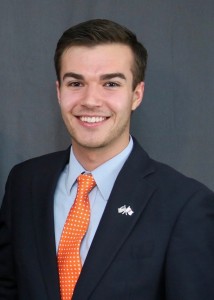This blog is written by guest blogger and MPA student Philip Lloyd Paige. 
I recently asked friends at other universities if they had ever personally met, and/or spent time with their university president/chancellor; the answer was a resounding “no.”
Last month students in my Public Organization and Management course had an incredibly unique opportunity to spend an entire day with Syracuse University Chancellor Kent Syverud. Chancellor Syverud was kind enough to condense his negotiation class into an eight-hour intensive session, which afforded 68 students immeasurably valuable and applicable skills.
Four students were nominated by their professors to serve as “facilitators” (Professor Mergel kindly nominated me), which entailed assisting Chancellor Syverud with administrative tasks throughout the day. On top of serving as a facilitator, I was randomly selected to publicly negotiate during the final exercise – lucky me, eh?
The suggestions and nuances of negotiation the chancellor provided and exposed are too numerous to list, but by the end of the day (at which point I was in the hot seat negotiating in front of my insanely accomplished peers, professors, and the chancellor himself) my teammate (Eric Horvath) and I were employing them, and apparently with great efficacy. My negotiation team walked away with a deal far better than we expected (though we didn’t let on our perceived weak hand), and the class gave us feedback that we had outperformed the other groups in the simulation.
The tools I found most effective were the “tell me more” questions, which help you overcome the information deficit inherent in a negotiation (the other side does not necessarily want you to know everything). By asking “tell me more” questions we were able to draw out information that gave us a more informed impression of what type of offer would be expected.
Another tool I learned was the importance of repeating back to the other teams what it is I thought I was hearing, for example I would say something to the effect of “my understanding is you want ____, is that correct?” Every response is an opportunity to examine body language, tone, inflection, and other tricks that might give you an indication of where those on the other side of the table are headed and what they really think.
I am very grateful to PAIA Department Chair David Van Slyke for organizing this event. I can speak for the 68 students there and say that Chancellor Syverud did us a great service and honor by spending the day with us, and teaching us some of the skills that have helped him throughout his distinguished career.